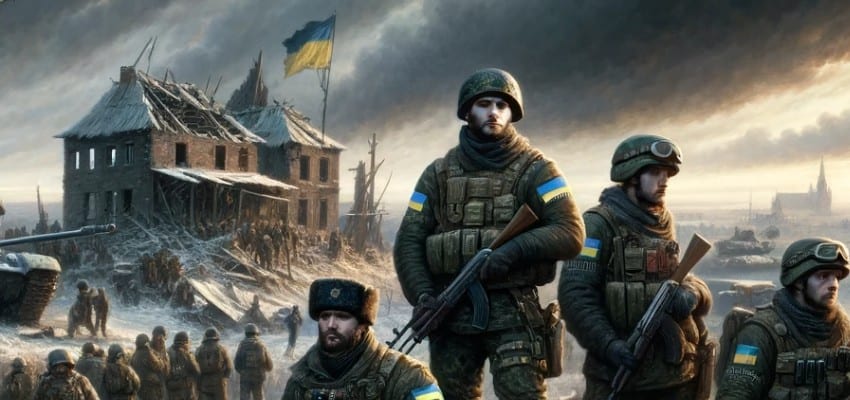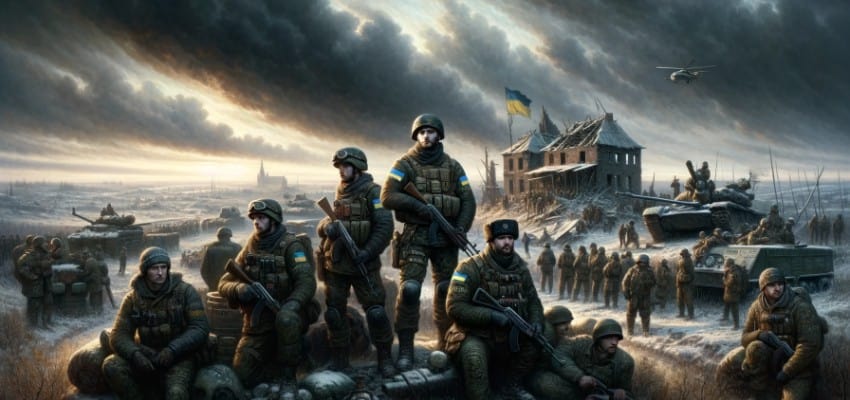Content Assessment: Ukraine Conflict Analysis: Stalemate and Strategic Dynamics (December 22, 2023)
Information - 93%
Insight - 92%
Relevance - 90%
Objectivity - 93%
Authority - 94%
92%
Excellent
A short percentage-based assessment of the qualitative benefit expressed as a percentage of positive reception of the recent synthesis of reporting from the Institute for the Study of War on the Russo-Ukrainian War.
Source Note: One of the most accurate and detailed sources for ongoing updates on the Ukraine crisis is the Russian Offensive Campaign Assessment from the Institute for the Study of War. The Institute for the Study of War (ISW) is a 501(c)(3) organization and produces strictly non-partisan, non-ideological, fact-based research. ISW seeks to promote an informed understanding of war and military affairs through comprehensive, independent, and accessible open-source research and analysis. ISW’s research is made available to the general public, military practitioners, policymakers, and media members. Providing a daily synthesis of key events related to the Russian aggression against Ukraine, ISW updates may benefit investigators and litigators as they follow the business, information technology, and legal trends and trajectories impacted by and stemming from the current Russo-Ukrainian conflict.
For those seeking to grasp the full scope of this evolving landscape, the complete updates from the Institute for the Study of War serve as an invaluable resource.
Russo-Ukrainian Conflict Update*
Ukraine Conflict Analysis: Stalemate and Strategic Dynamics
ComplexDiscovery Staff
As of December 22, 2023, the war in Ukraine remains locked in a complex stalemate, with neither side achieving decisive breakthroughs. Ukrainian officials continue to caution that Russia’s expansive war aims in Ukraine persist despite Western assertions of Russian strategic setbacks. NATO Secretary General Jens Stoltenberg and U.S. Secretary of State Antony Blinken have recently indicated that Russia’s failure to achieve its principal war goals represents a major strategic defeat. However, Major General Vadym Skibitskyi of Ukraine’s GUR suggests that Russia might recalibrate its objectives for the next year, implying that the conflict is far from a conclusive end.
A significant development in the conflict is the upcoming delivery of F-16 fighter jets to Ukraine, confirmed by Dutch Prime Minister Mark Rutte. This decision by the Netherlands, backed by several other European nations, marks a crucial escalation in Western military support for Ukraine. The provision of these advanced aircraft could significantly enhance Ukraine’s defensive capabilities, potentially altering the aerial dynamics of the conflict.
On the Russian side, the reported loss of three Su-34 attack aircraft in southern Ukraine highlights the effectiveness of Ukrainian air defenses. This incident has raised serious concerns among Russian military bloggers about vulnerabilities in the VKS’s operations, suggesting a potential shift in the balance of air power in the region.
The Wall Street Journal’s report on the assassination of Wagner Group financier Yevgeny Prigozhin by Nikolai Patrushev, a close ally of President Putin, reveals deep-seated power struggles within the Kremlin. This incident illustrates the complex interplay of loyalty, ambition, and survival in the upper echelons of Russian power, potentially influencing Moscow’s strategic decisions in Ukraine.
Despite recent setbacks, Russia continues to exert influence in other geopolitical arenas. The Kremlin’s nuanced stance in the Israel-Hamas conflict, particularly its recent anti-Israel rhetoric coupled with a professed neutrality, underscores its intention to maintain a significant role in Middle Eastern politics. This posture also indicates Russia’s broader strategic ambitions to assert its influence beyond the immediate confines of the Ukrainian conflict.
In response to Russia’s continued aggression, the United States, under President Joe Biden, has intensified economic pressures. The recent executive order targeting financial institutions that facilitate Russian sanction evasion represents a concerted effort to undermine Russia’s military-industrial complex and broader economic stability. These sanctions are a testament to the ongoing international resolve to counter Russian aggression.
The strained Russian-Armenian relationship, despite official attempts to present a united front, speaks to the broader issue of Russia’s waning influence in the South Caucasus. Armenia’s growing distance from Russia, especially in the wake of the Nagorno-Karabakh crisis, reflects the shifting dynamics within the region and the reevaluation of alliances in light of the Ukrainian conflict.
The situation as of December 22, 2023, underscores a war entrenched in a strategic deadlock, with both Ukraine and Russia experiencing challenges and recalibrations. International support and diplomatic efforts continue to play a crucial role in shaping the course of the conflict. The intricate web of military engagements, political narratives, and global alliances continues to define the complex landscape of the Ukraine war, with no immediate resolution in sight.
Additional Information
- Institute for the Study of War (understandingwar.org)
- Battlefield to Geopolitics: Russia’s Extended Offensive and Ukraine’s Defiant Stance (December 15, 2023) (complexdiscovery.com)
We do not report in detail on Russian war crimes because those activities are well-covered in Western media and do not directly affect the military operations we are assessing and forecasting. We will continue to evaluate and report on the effects of these criminal activities on the Ukrainian military and population and specifically on combat in Ukrainian urban areas. We utterly condemn these Russian violations of the laws of armed conflict, Geneva Conventions, and humanity even though we do not describe them in these reports.
Detailed Reporting with Maps for December 22, 2023, from the ISW – Mouseover to Scroll
2023-12-22-PDF-Russian Offensive Campaign AssessmentReview the Detailed Reporting and Maps PDF
About the Institute for the Study of War Research Methodology
ISW’s research methodology relies on both primary and secondary sources, enabling researchers to develop a comprehensive understanding of the situation on the ground. In order to analyze military and political developments in any given area, ISW’s research analysts must wholly understand the systems of enemy and friendly forces. They must also understand the population demographics, physical terrain, politics, and history of that area. This lays the analytical foundation for understanding the reasons for particular developments and fulfilling their assigned research objectives. ISW analysts also spend time in places like Iraq, Afghanistan, and elsewhere in order to gain a better understanding of the security and political situation and to evaluate the implementation of current strategies and policies. Our researchers compile data and analyze trends, producing a granular analysis of developments in areas of research, producing an accurate, high-resolution, timely, and thorough picture of the situation. ISW’s research methodology guarantees its success and commitment to improving the nation’s ability to execute military operations, achieve strategic objectives, and respond to emerging problems that may require the use of American military power.
About the Institute for the Study of War
The Institute for the Study of War advances an informed understanding of military affairs through reliable research, trusted analysis, and innovative education. We are committed to improving the nation’s ability to execute military operations and respond to emerging threats in order to achieve U.S. strategic objectives. ISW is a non-partisan, non-profit, public policy research organization.
Learn more, get involved, and contribute today.
Additional Reading
- From Dissent to OSINT? Understanding, Influencing, and Protecting Roles, Reputation, and Revenue
- [Annual Update] International Cyber Law in Practice: Interactive Toolkit
- Data Embassies: Sovereignty, Security, and Continuity for Nation-States
Assisted by GAI and LLM Technologies
* Sourced and shared with direct express permission from the Institute for the Study of War (ISW).
Source: ComplexDiscovery





































